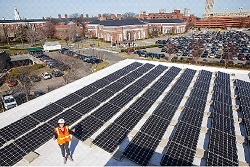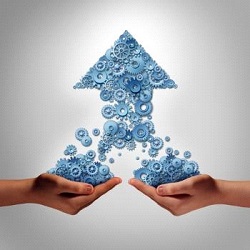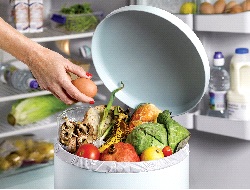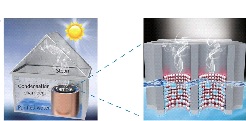May-June Sustainable Development
Read the articles selected in May-June 2016
Ogni anno la malnutrizione uccide 3,1 milioni di bambini, secondo Save the Children
Source: http://www.asvis.it/

42,5 percent of the Children in South-Asia and 37,6 percent in Sub-saharian suffers from malnutrition. The UN Convention on the Rights of the Child obligates the legislations of the States members to contrast this reality.
Read more:
Household Consumption (EPIC)
Source: http://www.oecd.org/
An OECD survey on 10.000 respondents analyses what determines the consumers choices toward greener lifestyles and how policies can influence the citizens household behaviour in daily life for all that has an impact on the environment.
Read more:
http://www.oecd.org/environment/consumption-innovation/households.htm
A huge, floating screen will sift plastic out of the Ocean
by Knvul Sheikh
Source: Scientific American, 24 June

A Dutch nonprofit foundation has launched a project to clean the oceans through a floating barrier that will collect plastic trash. If the test with a 100-meter prototype in the North Sea will succeed, t a 100km long filter-barrier will be deployed between Haway and the U.S. west coast.
Read more:
http://www.scientificamerican.com/article/a-huge-floating-screen-will-sift-plastic-out-of-the-ocean/
Ozone layer on the mend, thanks to chemical ban
by Eric Hand
Source: Science, 30 June

The Antarctic hozone hole is shrinking. Evidently the 1987 international agreement on the industrial production of chlorofluorocarbons has had its result. Researcher have used a 3D atmospheric model to separate the effects of chemicals from those of weather.
Read more:
http://www.sciencemag.org/news/2016/06/ozone-layer-mend-thanks-chemical-ban
Targeting food safety and health benefits, npj Science of Food announced in China
by Zhang Li
Source: Nature, 30 June
Nature Research with an agreement with Beijing university has launched the journal Science of Food, to study the effects of food processing and additives on the health of consumers and to bridge food and nutrition sciences with biological and medical sciences.
Read more:
http://www.nature.com/press_releases/npj-science-of-food.html
Nella Giornata Mondiale del Rifugiato l’Unhcr lancia la campagna #WithRefugees
by Flavia Belladonna
Source: http://www.asvis.it/, 21 June

After the UNHCR report on the migrants situation in the world, EU migratory politics figures out among the explicit priorities of the European Commission. Meanwhile, UNHCR has launched a campaign to sensitivize the public opinion against intolerance and disinformation.
Read more:
The Humanities and Environmentalism
by Martin Greenup
Source: https://green.harvard.edu/, 17 June

Environmentalism is also a matter of the Humanities. An Harvard’s course in Expository Writing, that trains students as academic writers and critical thinkers, is concerned with the relationship between humanities and nature, and with the power of imagination to change the environment.
Read more:
https://green.harvard.edu/news/humanities-and-environmentalism
Daring to care: deep ecology and effective popular environmentalism
by Zeke Benshirim
Source: green.harvard.edu/, 21 June

This article goes back to the origins in the 1960s of the international environmental movement , from Naess’ “deep ecology,” that rejected the anthropocentrism, to Lovelock’s anthropocentric vision of Earth as a “living superorganism” and to the “deep love for the beauty of nature” of Carson’s “Silent spring”.
Read more:
https://green.harvard.edu/news/daring-care-deep-ecology-and-effective-popular-environmentalism
The way Americans eat is becoming more divided
by Lisa Rapaport
Source: Scientific American, 21 June

Standing to a study that looked at 34.000 adults, Americans are improving their diet, but racial disparities in eating habits still persist, and depend not only on popular culture and physician education, but also and almost on affordability.
Read more:
http://www.scientificamerican.com/article/the-way-americans-eat-is-becoming-more-divided/
More ambitious policies needed to address changes facing agriculture
by Carmel Cahill
Source: http://www.oecd.org/, 16 June
A new OECD report highlights the need to move from assistance policies in agricultural sector like price support and input subsidies to policies for innovation , productivity and sustainability.
Read more:
1 persona su 113 costretta alla fuga nel mondo: le migrazioni forzate raggiungono i livelli più alti di sempre
Source: https://www.unhcr.it/, 20 June 2016
The striking UNHCR data on refugees all over the world, 65.3 m people,1 person out of 113, half of them children, forced to escape because of wars and persecutions, show evidently that refugees are not “them”, but they are part of us, because it’s the collective interest of the humankind at stake.
Read more:
https://www.unhcr.it/news/comunicati-stampa/3024.html
Environmental governance for all
by Eduardo S. Brondizio and Francois-Michel Le Tourneau
Source: Science, 10 June

Engaging with the claims, rights and knowledge of local and indigenous populations in the immense and sparsely populated territories of the world, distant from our overpopulated civilization, is crucial for a governance that would combine poverty alleviation and environmental policy.
Read more:
http://science.sciencemag.org/content/352/6291/1272.full
Nutrition: Fall in fish catch threatens human health
by Christopher D. Golden, Edward H. Allison, William W. L. Cheung, Madan M. Dey, Benjamin S. Halpern, Douglas J. McCauley, Matthew Smith, Bapu Vaitla, Dirk Zeller& Samuel S. Myers
Source: Nature,15 June 2016

The increasing population living on Earth, and in particular in the developing nations, will have to face by 2050 nutritional deficiencies due to the lack of micronutrients provided by the declining fish populations.This perspective underlines the need of nutrition-sensitive fisheries policies.
Read more:
http://www.nature.com/news/nutrition-fall-in-fish-catch-threatens-human-health-1.20074
Appetite for Destruction: Some Fish are Developing a Taste for Microplastics
by Layla Eplett
Source: Scientific American, 10 June

Some larval fish living in the Baltic Sea and consumers of microplastics develope a food preference for plastic over the natural sources and become more likely to be eaten by predators, and these more likely to die for contaminants bioaccumulation.
Read more:
Aperta la consultazione pubblica sulla politica di sviluppo dell’Ue
by Lorenza Geronimo
Source: http://www.asvis.it/ 5 June

From 30 May to 21 August is open a public consultation where citizens can express their opinion about the European development policy. This initiative is an effect of the 2030 Agenda, that reformed the European Consensus to a more significative democratic participation.
Read more:
Implementing the Paris Agreement in a world of fossil abundance
by Simon Upton
Source: http://www.oecd.org/, 21 April
What governments do-or don’t do in the next very few years will determine once and for all the level of climate risk we are exposed to, but fossil fuels remain the dominant form of energy, powering the global expansion.
Read more:
http://www.oecd.org/environment/cc/Implementing-the-Paris-Agreement-web.pdf
Sustainability-engaging future generations now
by Ban Ki-moon
Source: The Lancet, 11 June 2016
Today’s young people will inherit the world we are trying to make better. And yet millions of girls and boys are trapped in a cycle of poverty and inequality. It is crucial to invest in adolescents, who are from now the key drivers of change.
Read more:
http://www.thelancet.com/journals/lancet/article/PIIS0140-6736(16)30271-9/fulltext?elsca1=etoc
Better Policies for 2030: an OECD Action Plan on the Sustainable Development Goals
Source: http://www.oecd.org/, 1-2 June
With this paper, the OECD supports the vision for the world provided by the 17 goals of the 2030 Agenda, which has contributed to shaping, with its historic engagement on all aspects of sustainable development, promoting sound public policies, working to generate evidence and indentifying good practices.
Read more:
http://www.oecd.org/education/OECD-action-plan-on-the-sustainable-development-goals-2016.pdf
Il ruolo della società civile e il programma di lavoro dell’Alleanza
Source: http://www.asvis.it/

The new Goals of Sustainable Development, defined with the participation of citizens and public authorities, can’t do without a good governance, without the safeguard of the fundamental rights and the fight against discriminations and violence to women.
Read more:
http://www.asvis.it/home/46-465/il-ruolo-della-societa-civile-e-il-programma-di-lavoro-dellalleanza
Discovering soil-less farming
by Katie Hammer,
Source: http://green.harvard.edu/, 1 June

An Harvard graduate is experimenting alternative farming methods for growing food in absence of soil. These systems, that save water and eliminate pesticides, can be considered in case of droughts, floods and food crises, but they rely completely on electricity.
Read more:
http://news.harvard.edu/gazette/story/2016/06/discovering-soil-less-farming/
Scholactivism – A growing movement of scholar-activists
by Rebecca Farnum
Source: University World News, 3 Giugno
“Scolactivism” is a kind of activism proper of academics, increasingly aware that the knowledge their work produce can lead to social change and shape society.
Read more:
http://www.universityworldnews.com/article.php?story=20160530142606345
Don’t overstate what judges (or clergy) can do to make a better world
Source: The Economist, 5 June

At a Vatican gathering the Pope told that there is nor order, nor sustainable development, nor peace, without combating human trafficking and forced labour, and that “justice” is not only application of laws, but also in a state of fairness and righteousness.
Read more:
http://www.economist.com/blogs/erasmus/2016/06/vatican-people-trafficking-and-justice
Looking for a home
Source: The Economist, 28 May

Europe, where the global refugee system of international protection for refugees began with the Un’s 1951 Refugee Convention, must apprehend how difficult its carefullly constructed asylum and border rules match with mass migrations, now that the world’s displaced population has reached 60 m.
Read more:
“Sostenibilità, uno spadone per affrontare la crisi”
by Donato Speroni
Source: http://www.asvis.it/, 31 May 2016

The meeting organized by ASviS on 30 May has underlined the importance of Government, media and enterprises’participation to the sustainability challenge, meaning not only an environmental, but also a social issue, that would ensure everybody dignity in the worklife, the right to health and the care of children and adolescents.
Read more:
http://www.asvis.it/home/46-678/sostenibilita-uno-spadone-per-affrontare-la-crisi
Exposure to common flame retardant chemicals may increase thyroid problems in women
Source:http://green.harvard.edu/, 25 May

A new study of researchers at Harvard has shown that post-menopausal women exposed to flame retardant chemicals are more likely to develop a tyroid desease. These chemicals are largely used in quantities up to 20% of the furniture, but migrate into the air in dust .
Read more:
Is Intelligence Hereditary?
Source: Scientific American, 1 May

Scientists are finding more and more genes that explain by now about 5 of 50%percent of the differences among people in intelligence. Predicting cognitive potential from DNA can be tremendously useful to prevent or to ameliorate cognitive deseases that result in intellectual disability.
Read more:
http://www.scientificamerican.com/article/is-intelligence-hereditary/
Settimana europea dello sviluppo sostenibile: il convegno ASviS (medaglia del Presidente della Repubblica) il 30 maggio e le altre iniziative degli aderenti
Source: http://www.asvis.it/, 19 May

In the European Week of the Sustainable Development, that will take place from 30 May to 5 June, are recommended some interessant appointments, such as the meetengs organized in Rome by Cgil “Green is the future of work”and in Trento by Acli: “A country at a juncture: which development?”.
Consulta l’articolo:
A platform to promote sustainable development in Europe
Fonte: http://www.esdw.eu/news/
The European Commission has created an internet platform on the ESDW website (http://www.esdw.eu/) where you can schedule and promote activities for the European Week from the 30 May to 5 June, inspiring people and policies at national and EU level to think the best strategies to realize the 17 SDGs.
Read more:
http://www.esdw.eu/press-release-esdw-2016/
Città sostenibili: le risposte dei candidati sindaci sugli obiettivi dell’Agenda 2030
Source: http://www.asvis.it/
ASviS and Anci have called the candidates mayors of next administrative elections, the first which will take place after the Agenda 2030 and the Paris Agreement, to work for “more inclusive, safe, long-lasting and sustainable” cities.
Read more:
Major cell phone radiation study reignites cancer questions
by Dina Fine Maron
Source: Scientific American, 27 May

The studies realized until now didn’t establish evident health effects from radio frequency signals used in cellphones. A new experiment showed that rates exposed to costant low level radiations developed rare forms of brain and heart cancer exhibiting a direct dose-response relationship.
Read more:
Preparing Harvard for the effects of climate change
by Adam Zewe
Source: http://green.harvard.edu/ , 24 May

Students in Harvard work with creativity to find climate change resilience strategies. For example , to cooling buildings during heat, they suggested thermal systems that chill water at night , and vents that let in cool air at night, expelling warm air during the day.
Read more:
http://www.seas.harvard.edu/news/2016/05/preparing-harvard-for-effects-of-climate-change
Why the historic deal to expand US chemical regulation matters
by Jeff Tollefson
Source: Nature, 25 May
The review bipartisan law about chemicals just approved by US Congress will give the EPA the power to require all informations from the companies, that won’t more allowed to oppose a trade secret. The EPA will take its decisions in order to ensure public safety without considering economic implications.
Read more:
http://www.nature.com/news/why-the-historic-deal-to-expand-us-chemical-regulation-matters-1.19973
When the drugs don’t work
Fonte: The Economist, 21 Maggio

The 700.000 deaths for antibiotics resistance could reach 10 m in 2050. Are important not only sensible policies and legislations, but also incentives to innovate, because consums and sales of new drugs have to be kept low for safety reasons and this slows research .
Consulta l’articolo:
Greens in pinstriped suits
Source: The Economist, 21 May

Four of the five largest private oil companies will meet their shareholders this week, in order to adjust their business plans to the more stringent climate change policies agreed in Paris in December , by now shared also by many climate-conscious shareholders.
Read more:
99 Percent Chance 2016 Will Be the Hottest Year on Record
by Andrea Thompson
Source: Scientific American, 18 May

2016 will be likely the hottest year on record, standing to the temperatures rated in April, after a continue remarkable streak of record-warm months. Temperatures will come down slightly next year, but there is evidence that we are getting to permanently exceeding key thresholds.
Read more:
http://www.scientificamerican.com/article/99-percent-chance-2016-will-be-the-hottest-year-on-record/
Negotiators Try to Figure Out What the Paris Climate Agreement Means
by Jean Chemnick
Source: Scientific American, 17 May

On 16 May started the Bonn Climate Change Conference whose task is to fill in the gaps left in the landmark Paris Agreement of last December. This will take effect when 55 countries totaling 55 percent of the world’s gas emissions will have joined.
Read more:
Academics to action with Austin Blackmon
by Victoria Elliot
Source: green.harvard.edu, 13 May
In a recent event organized in Harvard Boston’s Chief of Environment, Energy and Open Space, advised students to implement environmental change in positive ways, like studying at business schools, and to look at the success of startups, where the signs of progress are clear.
Read more:
http://green.harvard.edu/news/academics-action-austin-blackmon
Come preparare una buona strategia per lo sviluppo sostenibile. Le prime proposte della società civile
Source: http://www.asvis.it/
ASviS ha solicited the Government for a national sensitivization about Sustainable Development, and the Parliament for a legislative contribution to the 17 Onu Goals 2030. The Environment Minister underlined that it is a challenge able to draw a new model of a global society.
Read more:
Looking up
Source: The Economist, 14 May

In America the white, middle -class men aged 45 to 54% were more likely to die in 2013 than they were in 1999, and this has depended on the financial crisis and and on lower earnings. Across the whole population, the mortality depends less on economic circumstances.
Read more:
Can cities be sustainable?
byPola Lem
Source: Scientific American, 11 May

Cities are the drivers of climate change, in better and in worse. Urban sprawl leads to deforestation and to the increase of pollution, but cities have a big say in deciding how to plan their energy use in a social inclusive way.
Consulta l’articolo:
http://www.scientificamerican.com/article/can-cities-be-sustainable/
Hope for America's next generation
Source: Science, 6 May

Many studies have shown that poorer communities suffer worse health conditions. But a recent study challenges this conventional wisdom despite the rising inequality in almost every dimension of American life .
Read more:
http://science.sciencemag.org/content/352/6286/661.full
Targeting the ills of climate change
by Alvin Powell
Source: Green Harvard, 6 May

Secretary of State John Kerry has visited Harvard to help launch an important initiative focused on the effects of climate change on the global health, in order to reach a research- based understanding of problems usually overshadowed by more immediate concerns.
Read more:
http://news.harvard.edu/gazette/story/2016/05/targeting-the-ills-of-climate-change/
Biodiesel one slick solution, but more to come
by Colin Durrant
Source: Green Harvard, 10 May

Harvard’s university is a living laboratory for the discover and demonstration of the many ways of reducing energy and enhancing the well-being in a creative and personalized manner, opening new prospectives that are useful on a larger local, regional and global level.
Read more:
http://news.harvard.edu/gazette/story/2016/05/biodiesel-one-slick-solution-but-more-to-come/
Meeting in Rome during the European Week of Sustainable Development
On 30 May will take place a meeting organized by ASviS between experts, politicians, trade unionists and entrepreneurs, who will discuss together about the ONU goals 2030.
Factbook Ocse: aumentano gli investimenti per la ricerca, ma cresce la povertà relativa
Source: asvis.it, 30 April
The ASVIS website reports the indicators of the new Ocse’s Factbook about the advances in the 34 participant countries to the 17 Social Development Goals (SDGs), very useful for the historic and comparative data synthesis that offers.
“Investendo in resilienza e sicurezza alimentare si può combattere la fame e costruire la pace
Source: asvis.it, 28 April
With the report “Peace and Food security 2016” the Fao explains the vicious cycle between poverty and hunger, on one hand, and civil conflicts and political instability, on the other hand.
Read more:
Greening starts at home
Source: Green Harvard, 21 April
Multidisciplinary research and teaching are needed to face environmental challenges. Sustainability changes our lives, and requires a joint community effort from people of many different backgrounds.
Read more:
http://news.harvard.edu/gazette/story/2016/04/greening-starts-at-home/
Translating research into practice
Source: Green Harvard

The Harvard Community is engaged in the reduction of gas emissions, energy and organic waste, and that means not only to save energy, but also more efficiency and well-being.
Read more:
http://report.green.harvard.edu/
Forum 2016 Issues: Productivity & inclusive growth
Source: www.oecd.org

From 31 May to 2 June will take place the OECD Week, including a Forum and other meetings on the new concept of productivity, that means sustainable and inclusive growth, with the intent to extend knowledge and technology to the weaker companies.
Read more:
http://www.oecd.org/forum/issues/forum-2016-issues-inclusive-growth-and-productivity.htm
The nuclear option
Source: Nature, 4 May
22 of 44 nuclear plants under construction in the world are Chinese. Despite its zeal for advanced nuclear technology , China is promoving also the processing of atomic fuel. It would be simpler and safer to use green energies.
Read more:
http://www.nature.com/news/the-nuclear-option-1.19844
Saudi Arabia’s post-oil future

Source: The Economist, 30 April
Muhammad bin Salman, Saudi Arabia’s deputy crown prince, declared that by 2020 his kingdom will overcome any dependence on oil, investing instead in non-oil sectors with the promise of more work for the women.
A nuclear disaster that brought down an empire
Source: The Economist, 26 April

Thirty years ago Chernobyl’s radioactive explosion, 400 times stronger as Hiroshima, blew away the whole Sovietic system much more as did the perestroika.
Waste not, want not, emit less
by Jessica Aschemann-Witzel
Source: Science, 22 April

Waste of food involves not only waste of carbon emissions , but also an additional environmental impact for its disposal. Waste reducing requires synergic efforts by politics, culture, marketing and individual consumers.
Read more: http://science.sciencemag.org/content/352/6284/408.full
New water purification system could help slake the world’s thirst
by Robert Service
Source: Science, 27 April

New water purification solar-powered plants working with aluminium have been invented by Chinese researchers to face the lack access to fresh water that by 2025 will affect two-thirds of the world’s population.
Read more:
http://www.sciencemag.org/news/2016/04/new-water-purification-system-could-help-slake-world-s-thirst

